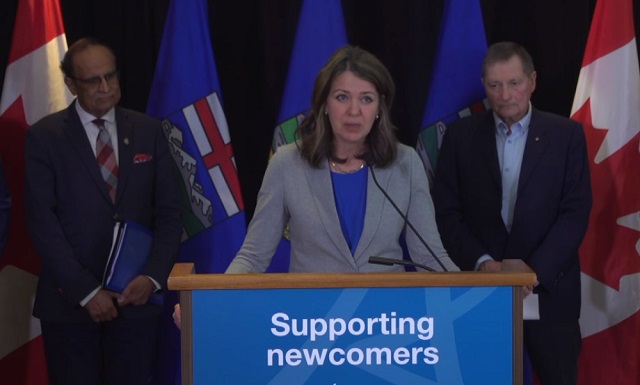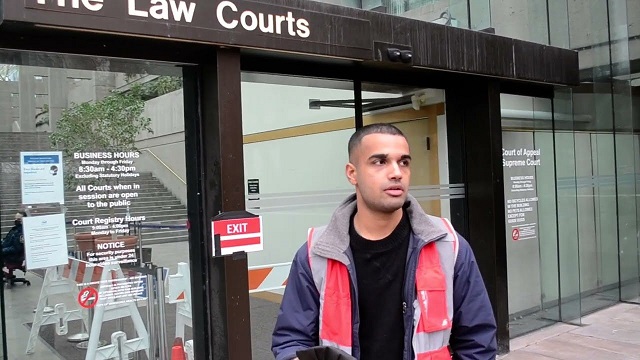Alberta
Alberta requests more control over provincial immigration system

Alberta is requesting more control over its provincial immigration to address its skilled workforce shortage, including increasing Ukrainian evacuee participation in the job market.
Premier Danielle Smith has written a letter to Prime Minister Justin Trudeau asking him to re-evaluate his government’s decision limiting the number of allocations for Alberta’s provincial nominee program in 2024. Last week, the federal government informed the province it would only receive 9,750 such allotments – which is the same number of allocations Alberta received in 2023 and is less than the 10,140 for 2024 the federal government had originally allocated.
As of February 2024, Alberta accounts for just under 12 per cent of Canada’s population, but it leads the nation in net employment growth, with 42.8 per cent of the country’s employment gains between January and February 2024. By not providing the requested increase to Alberta’s provincial nominee allocations, the federal government is restricting the province’s ability to keep up with its growing labour market demands, especially as it relates to integrating Ukrainian evacuees into Alberta’s job market.
“Alberta is growing and that is good news. Since January 2023, more than 100,000 new jobs have been created in our province and our employment rate has led the country even longer. At the same time, we continue to experience labour shortages that could be resolved by welcoming skilled workers from around the world, including evacuees from Ukraine, many of whom have the exact skills that our job market most needs. Alberta has long been the economic engine of Canada and we are once again requesting Ottawa respect section 95 of the Constitution and let us welcome the skilled individuals we need into our province on our terms.”
With Alberta’s population growth at levels not seen in four decades, Alberta’s Provincial Nominee Program is best placed to address the province’s unique immigration and economic goals.
Part of Alberta’s population growth has resulted from Russia’s invasion in Ukraine on February 24, 2022. Since that time, Alberta has welcomed a significant number of Ukrainian evacuees to the province. While it is anticipated that many will return to Ukraine following the war, Alberta is also expecting a number of families to apply for permanent residency via the Alberta Advantage Immigration Program. An increase in the number of allocations from the federal government would assist these new Albertans to fill positions in the province’s workforce.
“Immigration is key to Alberta’s ability to address labour shortages and to grow our economy. This limitation imposed by the federal government on our provincial nominee program will be a very difficult pill to swallow, not only for businesses that need this skilled labour but also to the many Ukrainian evacuees who have the skills we need and wish to stay permanently in Alberta.”
Quick facts
- The federal government through Immigration, Refugees and Citizenship Canada sets provincial immigration nomination limits. It also approves all permanent resident applications.
- Alberta maximized its 9,750 nomination allocations in 2023, with a total of 10,029 nominations issued within the federal government administrative buffer.
Related information
Alberta
Former senior financial advisor charged with embezzling millions from Red Deer area residents

News release from Alberta RCMP
Former senior financial advisor charged for misappropriating nearly $5 million from clients
On April 4, 2024, the RCMP’s Provincial Financial Crime Team charged a Calgary resident for fraud-related offences after embezzling millions of dollars from his clients while serving as a senior financial advisor.
Following a thorough investigation, the accused is alleged to have fraudulently withdrawn funds from client accounts and deposited them into bank accounts he personally controlled. A total of sixteen victims were identified in the Red Deer area and suffered a combined loss of nearly $5 million.
Marc St. Pierre, 52, a resident of Calgary, was arrested and charged with:
- Fraud over $5,000 contrary to section 380(1)(a) of the Criminal Code; and,
- Theft over $5,000 contrary to section 344(a) of the Criminal Code.
St. Pierre is scheduled to appear in Red Deer Provincial Court on May 14, 2024.
“The ability for financial advisors to leverage their position to conduct frauds and investment scams represents a significant risk to the integrity of Alberta’s financial institutions. The investigation serves as an important reminder for all banking clients to regularly check their accounts for any suspicious activity and to report it to their bank’s fraud prevention team.”
- Sgt. John Lamming, Provincial Financial Crime Team
The Provincial Financial Crime Team is a specialized unit that conducts investigations relating to multi-jurisdictional serious fraud, investments scams and corruption.
Alberta
Political parties will be part of municipal elections in Edmonton and Calgary pilot projects

Strengthening Alberta’s local elections
Alberta’s government is introducing legislation to ensure Albertans can rely on transparent, free and fair elections, and municipally-elected officials have clearer accountability measures.
In a democratic society, Albertans expect their local elections to be free and fair, and their elected officials to be held to account by clear rules that govern their local councils. The Municipal Affairs Statutes Amendment Act proposes amendments to the Local Authorities Election Act (LAEA) and the Municipal Government Act (MGA) to add greater transparency to local election processes and ensure local councils and elected officials continue to remain accountable to the citizens who elected them.
“Our government is committed to strengthening Albertans’ trust in their local governments and the democratic process that elects local leaders. The changes we are making increase transparency for Alberta voters and provide surety their votes will be counted accurately. We know how important local democracy is to Albertans, and we will work with local authorities to protect and enhance the integrity of local elections.”
Local Authorities Election Act
Albertans expect free and fair elections and that’s why it’s important we strengthen the rules that govern local elections. To strengthen public trust in local elections, Alberta’s government will eliminate the use of electronic tabulators and other automated voting machines. All Albertans should be able to trust the methods and results of local elections; requiring all ballots to be counted by hand, clarifying rules and streamlining processes for scrutineers will provide voters greater assurance in the integrity of the results.
All eligible Albertans should be able to vote in local elections without impediment. Alberta’s government will limit the barriers for eligible voters to cast a ballot by expanding the use of special ballots. Currently, special ballots can only be requested for very specific reasons, including physical disability, absence from the municipality, or for municipal election workers. By expanding the use of special ballots, the government is encouraging more voter participation.
Amendments in the Municipal Affairs Statutes Amendment Act would increase transparency in local elections by enabling political parties at the local level. Political parties would be enabled in a pilot project for Edmonton and Calgary. The act will not require candidates to join a political party in order to run for a local or municipal office, but will create the opportunity to do so.
In addition, proposed changes to the Local Authorities Election Act would allow municipalities the option to require criminal record checks for local candidates, thus increasing transparency and trust in candidates who may go on to become elected officials.
Municipal Government Act
The role of an elected official is one with tremendous responsibility and expectations. Changes proposed to the Municipal Government Act (MGA) will strengthen the accountability of locally elected officials and councils. These include requiring mandatory orientation training for councillors, allowing elected officials to recuse themselves for real or perceived conflicts of interest without third-party review and requiring a councillor’s seat to become vacant upon disqualification.
If passed, the Municipal Affairs Statutes Amendment Act will also unlock new tools to build affordable and attainable housing across Alberta. Proposed amendments under the MGA would also create more options for municipalities to accelerate housing developments in their communities. Options include:
- Exempting non-profit, subsidized affordable housing from both municipal and education property taxes;
- Requiring municipalities to offer digital participation for public hearings about planning and development, and restricting municipalities from holding extra public hearings that are not already required by legislation; and
- Enabling municipalities to offer multi-year residential property tax exemptions.
Municipal Affairs will engage municipalities and other partners over the coming months to hear perspectives and gather feedback to help develop regulations.
Quick facts
- The LAEA establishes the framework for the conduct of elections in Alberta municipalities, school divisions, irrigation districts and Metis Settlements.
- The MGA establishes the rules governing the conduct of local elected officials once on council, as well as the overall administration and operation of municipal authorities in Alberta, including any policy those authorities may wish to implement.
Related information
-

 COVID-1914 hours ago
COVID-1914 hours agoPfizer reportedly withheld presence of cancer-linked DNA in COVID jabs from FDA, Health Canada
-

 Censorship Industrial Complex1 day ago
Censorship Industrial Complex1 day agoJordan Peterson, Canadian lawyer warn of ‘totalitarian’ impact of Trudeau’s ‘Online Harms’ bill
-

 Alberta2 days ago
Alberta2 days agoAlberta rejects unconstitutional cap on plastic production
-

 Alberta1 day ago
Alberta1 day agoAlberta official reveals ‘almost all’ wildfires in province this year have been started by humans
-

 Bruce Dowbiggin1 day ago
Bruce Dowbiggin1 day agoCome For The Graduate Studies, Stay For The Revolution
-

 Business2 days ago
Business2 days agoTaxpayers criticize Trudeau and Ford for Honda deal
-

 Business2 days ago
Business2 days agoDon’t be fooled by high-speed rail
-

 Alberta1 day ago
Alberta1 day agoPolitical parties will be part of municipal elections in Edmonton and Calgary pilot projects








